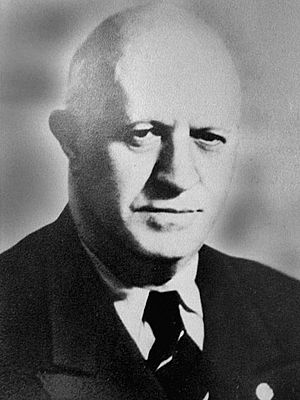Vasil Kolarov facts for kids
Quick facts for kids
Vasil Kolarov
|
|
|---|---|
| Васил Коларов | |
 |
|
| 33rd Prime Minister of Bulgaria | |
| In office 2 July 1949 – 23 January 1950 Acting: 2 July 1949 - 20 July 1949 |
|
| Preceded by | Georgi Dimitrov |
| Succeeded by | Valko Chervenkov |
| Chairman of the Provisional Presidency of Bulgaria | |
| In office 15 September 1946 – 9 December 1947 |
|
| Preceded by | Simeon II as King of Bulgaria |
| Succeeded by | Mincho Neychev as Chairman of the Presidium of the National Assembly |
| Personal details | |
| Born | 16 July 1877 Shumen, Ottoman Empire |
| Died | 23 January 1950 (aged 72) Sofia, People's Republic of Bulgaria |
| Nationality | Bulgarian |
| Political party | BCP |
| Other political affiliations |
BRSDP (1897–1903) BRSDP-Narrow Socialists (1903–1919) |
| Military service | |
| Allegiance | |
| Branch/service | Bulgarian Land Forces |
| Rank | Second lieutenant |
| Battles/wars | Balkan Wars |
Vasil Petrov Kolarov (Bulgarian: Васил Петров Коларов; 16 July 1877 – 23 January 1950) was an important Bulgarian political leader. He was a key figure in the Bulgarian Communist Party and served as the Prime Minister of Bulgaria. He also played a big role in an international group called the Communist International (Comintern).
Contents
About Vasil Kolarov
Early Life and Education
Vasil Kolarov was born on July 16, 1877, in a city called Shumen. At that time, Shumen was part of the Ottoman Empire, but it is now in Bulgaria. His father worked as a shoemaker.
After finishing high school in Varna, Vasil worked as a teacher for two years, from 1895 to 1897. In 1897, he joined a political group called the Bulgarian Workers' Social Democratic Party.
Kolarov then went on to study law. He studied in France, in a city called Aix-en-Provence, and also at the University of Geneva. After he finished his studies in 1900, he started working as a lawyer. He worked in his hometown and later in Plovdiv.
Becoming a Political Leader
The Bulgarian Workers' Social Democratic Party later split into different groups. Vasil Kolarov chose to join the "Tesniak" (Narrow) wing of the party. This group believed in a type of political change called revolutionary socialism.
From 1904 to 1912, Kolarov led the Tesniak group in Plovdiv. In 1905, he became a member of the group's main leadership committee. He also represented the Tesniak group at important international meetings in Stuttgart (1907) and Copenhagen (1910).
During the Balkan Wars, Kolarov served in the Bulgarian army as a second lieutenant. In 1913, he was elected to the Bulgarian National Assembly, which is like the country's parliament.
In April 1919, the Bulgarian Communist Party was formed. Vasil Kolarov was chosen as the first Secretary of its Central Committee. This was a very important leadership role.
Working with the Comintern
Vasil Kolarov became a key official in the Communist International (Comintern). This was an international organization that worked to spread communism around the world.
In 1920, Kolarov was arrested in Romania. Because of this, he could not attend an important meeting of the Comintern. However, he was able to attend the next meeting in Moscow in 1921.
Kolarov was elected to the main committee of the Comintern, called the Executive Committee. In early 1923, he traveled around Europe for the Comintern. He attended meetings in cities like Paris, Frankfurt, and Prague.
In June 1923, Kolarov returned to Bulgaria in secret. He was arrested but then released. He then worked with another leader, Georgi Dimitrov, to convince the Bulgarian Communist Party to start an uprising. This uprising happened in September 1923, but it failed. Kolarov had to leave Bulgaria and went to the Soviet Union. He lived there for more than 20 years.
While in exile, Kolarov remained a top official in the Comintern. He led discussions at their meetings. He was also the President of the Executive Committee of the Peasant International, a group for farmers, from 1928 until it closed in 1939. In 1943, Kolarov signed the document that officially closed the Communist International.
Return to Bulgaria
In 1945, Vasil Kolarov returned to Bulgaria. At this time, the Soviet Union was occupying Bulgaria. He was elected to the National Assembly again.
In 1946, he was reelected and became the provisional president of Bulgaria. This happened as the communists were gaining more and more power in the country. He stayed president until December 1947. At that time, a new government was formed, led by Georgi Dimitrov. Kolarov joined this government as a deputy prime minister and the Minister of Foreign Affairs.
His Final Years
When Georgi Dimitrov passed away in July 1949, Vasil Kolarov was chosen to take his place as prime minister. He served in this important role for a few months.
Vasil Kolarov died in Sofia on January 23, 1950. His funeral was a state funeral, which means it was a very important public event. His body was buried in the Georgi Dimitrov Mausoleum.
To honor him, his hometown of Shumen was renamed Kolarovgrad between 1950 and 1965.
See also
 In Spanish: Vasil Kolarov para niños
In Spanish: Vasil Kolarov para niños
 | William L. Dawson |
 | W. E. B. Du Bois |
 | Harry Belafonte |

